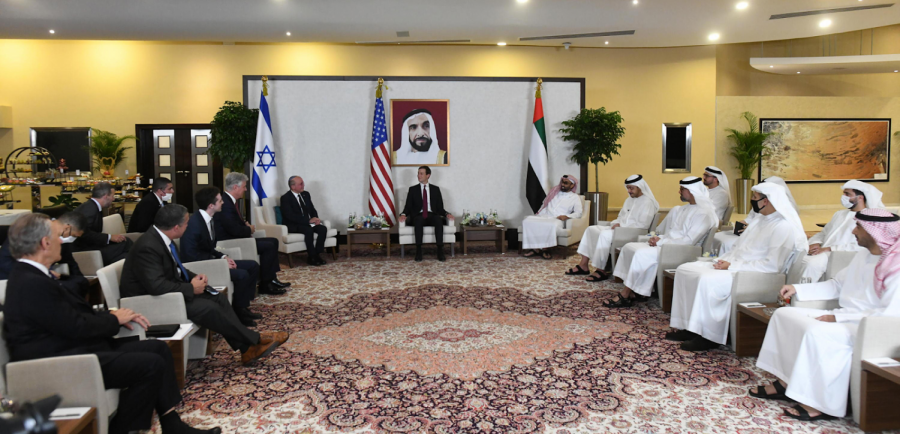Israel and the UAE Pen a Historic Peace Agreement: The Abraham Accords
September 21, 2020
The Abraham Accords, according to an Aug. 13 joint statement from Israel, the United States, and the United Arab Emirates, seek to establish “the full normalization of relations between Israel and the United Arab Emirates.” In the weeks following the statement, delegations from Israel and the UAE have worked on new bilateral agreements on a multitude of issues that, in time, will culminate in full diplomatic relations at the ambassadorial level.
The joint statement lays out multiple areas of potential cooperation, including tourism, direct flights (the first of which was completed on Aug 31 from Tel Aviv to Abu Dhabi), security, technology, and science. The statement emphasizes accelerating cooperation between Israeli and Emirati scientists working on a vaccine for COVID-19.
Although not specifically stated in the joint statement, the Council on Foreign Relations, a U.S. think tank focusing on foreign policy, says that the accords reaffirm and enhance “security cooperation against regional threats, especially Iran and its proxies.” The deal brings previously rumored security ties into the open.
The Abraham Accords have revolved around the issue of annexation. The original impetus for the deal, according to the Council on Foreign Relations, was when Israel did not move forward with annexing West Bank territory on July 1st as Netanyahu previously indicated. The UAE then promised a full normalization of relations if annexation was taken off the table. Israel’s halt in the West Bank, combined with the two countries’ shift towards normalization in the past years, and a United States administration to preside over negotiations caused the three nations to make a deal.
“It immediately stops annexation and the potential of violent escalation” said Emirati ambassador to the United States, Yousef Al Otaiba. Israeli statements use the word “suspend” rather than stop, an effort by Israeli Prime Minister Benjamin Netanyahu to pacify pro-annexation political groups in Israel.
Although the Abraham Accords supposedly promised an end to annexation, Palestinian leadership widely denounced the deal and recalled their ambassador from Abu Dhabi. Palestinian critics of the deal say that it reflects bad faith on the part of Israel, the United States, and especially the Emirates, who have been normalizing relations with Israel without asking for a halt to annexation well before the accords. Moves by Israel and the United States, such as Israel keeping tight control over the Gaza Strip or the Trump administration’s choice to move the U.S. embassy to Jerusalem, demonstrate that neither government has much interest in returning to the negotiation table with Palestine. Due to the normalization of diplomatic relations with Israel, the Emirates, at least according to the Palestinian leadership, have betrayed the Palestinian cause.
Reactions from the Jewish community have generally been positive, however, the issue of annexation again causes some controversy. The Union for Reform Judaism praised the deal for normalizing relations and for halting annexation. A statement released by the Union said, “Annexation was and remains a threat to the prospects for peace.”
A similar message was echoed by Emery Weiner Head of School, Stuart Dow, who was excited for “Israel’s acceptance to become increasingly normative in the Arab world,” but was concerned that said normalization could displace the need to resolve the Palestinian issue. Dow says that the issue “continues to be a social & moral quandary for the Jewish State.”
On the other hand, politically conservative Jews, Zionist evangelical Christians, and many settlers supported Netanyahu’s plan to make certain West Bank areas a part of Israel, and now that the process has been suspended, they feel as if the Prime Minister has reneged on his promise. The mayor of Beit El settlement, Shai Alon, expressed these sentiments saying that Netanyahu “pulled a fast one on the settlers.”
As of Sept. 11, President Trump announced that Bahrain, the country most likely to follow the UAE, will normalize ties with Israel in a similar peace agreement.
